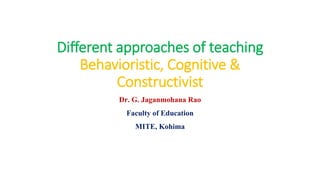
Different Approaches of Teaching
- 1. Different approaches of teaching Behavioristic, Cognitive & Constructivist Dr. G. Jaganmohana Rao Faculty of Education MITE, Kohima
- 2. Learning has been defined in numerous ways by many different theorists, researchers and educational practitioners. Although universal agreement on any single definition is nonexistent, many definitions employ common elements. The following definition by Shuell (as interpreted by Schunk, 1991) incorporates these main ideas: “Learning is an enduring change in behavior, or in the capacity to behave in a given fashion, which results from practice or other forms of experience”.
- 4. Behaviorism: Learning is a response to external stimuli • Theory, focuses on the behavior of the learner and changes in behavior that occurs when learning takes place. • Underpinning by the principles of stimulus responses. • All behavior is explained without the need to consider internal mental states or consciousness. Examples of application of Behavioristic view of learning: • Rote work • Repetitive practice • Bonus points • Participation points • Verbal reinforcement
- 6. Behavioristic View Of Learning: Teacher is the dominant person in the classroom. Complete control, evaluation or reflection with in the learning process. In the learning processes the teacher decide what is right or wrong. Learning only focuses on the external changes of the learner, have no any importance to the emotions or mental states of them. Behavioristic View Of Learner: • Learner is passive • Learner responding to environmental stimuli • Behaviorist believes – learner behavior is shape by positive reinforcement & negative reinforcement • Learner does not have any opportunity for evaluation or reflection with in the learning process
- 7. Behavioristic View Of Teacher: • Teacher is the dominant person. • Teacher providing stimulus material and promoting the correct responses. • classical conditioning, operant conditioning an social learning. • Teacher can encourage or discourage a student by using positive or negative reward. • Teachers should be the role model for students • He motivate facilitates learning Behavioristic View Of Classroom: • A teacher uses behaviorism to manage his / her classroom • Teacher should use operant conditioning to reward or punish his / her students
- 9. Cognitivism: • Focuses on mental processes, including how people think perceived an learn, to solve problems an their attention to one stimulus. • Totally different from behaviorism • It focuses the processing of information, how the learner organizes new information with in the pre-existing one. Cognitive view of learning: Cognitive learning believe learning occurs through internal processing of information Learning includes the reorganization of experiences either by attaining new insights or changing old ones. Examples of application of cognitive learning Classifying or chunking information Linking concepts, Providing structure, Discussion, Problem solving
- 10. Cognitive View Of Teacher: • Teacher is to assist the learner application of the proper learning strategies and the learner is active in the learning process • Teacher gives students the tools to organize information for easier coding, storage, and retrieval • Expository teaching & Meaningful learning method Cognitive View Of Learner: Student is active role Students use sensory, short term memory an long term memory to store information learning in class. Use existing knowledge to connect new information to help students retain information.
- 11. Cognitive View Of Classroom: Teachers should understand an incorporate different learning styles in classroom Each student has a different type of intelligence They use their dominant intelligence, while also working to improve their non dominant intelligence.
- 12. Constructivism: Constructivism says that people construct their own understanding and knowledge of the world, through experiencing things and reflecting on those experiences. Constructivism is a learning strategy that draws on students' existing knowledge, beliefs, and skills. With a constructivist approach, students synthesize new understanding from prior learning and new information. A theory base on observation an scientific study about how people learn Learner construct their own understanding and knowledge of the world through experiences an reflecting on these experiences Constructivist View Of Learning: • Constructivist view of learning , the learner constructs their own knowledge • Now Constructivist view of learning • Students control their own learning processes • Constructivism is closely line to learning through social learning and project base learning
- 13. Constructivist View Of Teacher: • Teacher role is to facilitate discussion • Teacher is only a guide • Systematic approach to supporting the learner, focusing on the task, environment, the teacher and the learner. • Provides temporary frame work to support learning and student performance beyond their capacities. Constructivist View Of Learner: Student centered Learner is self directed , creative and innovative in nature. Learner must construct their own understanding of the world in which they live Develop skills by solving gained from experimentation an increase the confidences in their learning
- 14. Constructivist View Of Classroom: • The learners are actively involve • The environment is democratic • The activities are interactive an student centered Some activities encourage in constructivist classroom are • Experimentation • Research project • Field trips • films
